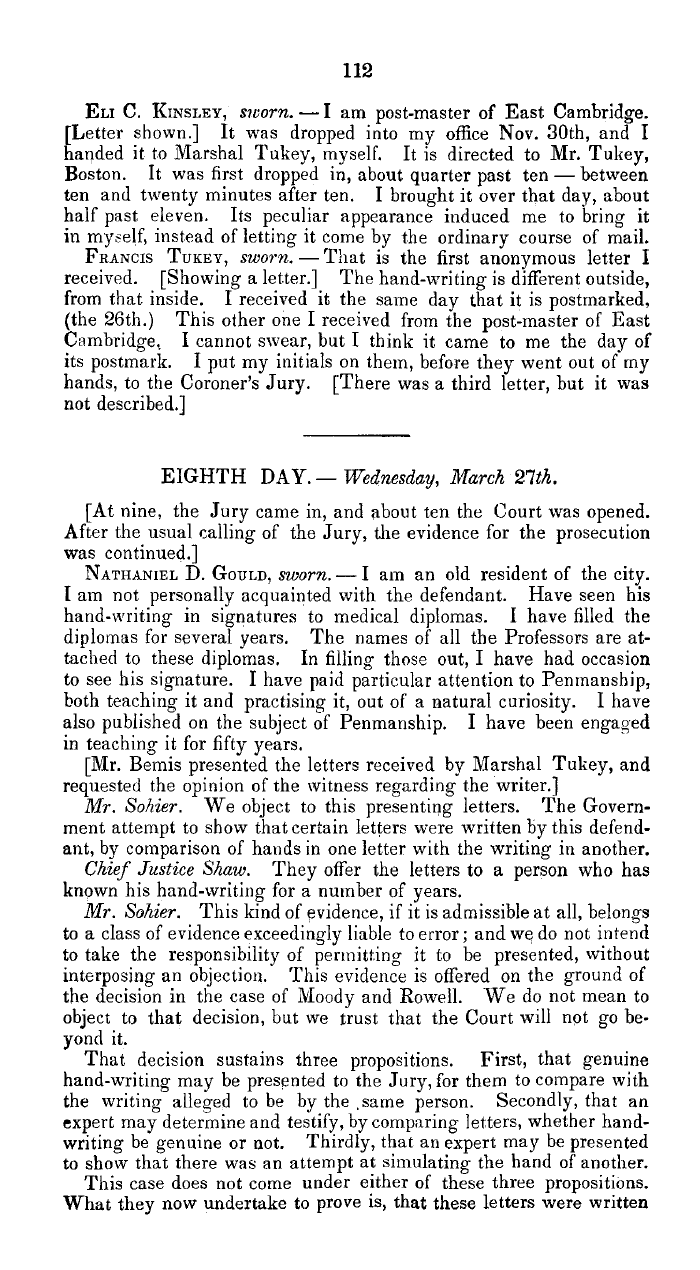|
112
ELI C. KINSLEY, sworn. -I am post-master of East Cambridge.
[Letter shown.] It was dropped into my office Nov. 30th, and I
handed it to Marshal Tukey, myself. It is directed to Mr. Tukey,
Boston. It was first dropped in, about quarter past ten - between
ten and twenty minutes after ten. I brought it over that day, about
half past eleven. Its peculiar appearance induced me to bring it
in myself, instead of letting it come by the ordinary course of mail.
FRANCIS TUKEY, sworn. - That is the first anonymous letter I
received. [Showing a letter.] The hand-writing is different outside,
from that inside. I received it the same day that it is postmarked,
(the 26th.) This other one I received from the post-master of East
Cambridge., I cannot swear, but I think it came to me the day of
its postmark. I put my initials on them, before they went out of my
hands, to the Coroner's Jury. [There was a third letter, but it was
not described.]
EIGHTH DAY. -Wednesday, March 27th.
[At nine, the Jury came in, and about ten the Court was opened.
After the usual calling of the Jury, the evidence for the prosecution
was continued.]
NATHANIEL D. GOULD, sworn. -I am an old resident of the city.
I am not personally acquainted with the defendant. Have seen his
hand-writing in signatures to medical diplomas. I have filled the
diplomas for several years. The names of all the Professors are at-
tached to these diplomas. In filling those out, I have had occasion
to see his signature. I have paid particular attention to Penmanship,
both teaching it and practising it, out of a natural curiosity. I have
also published on the subject of Penmanship. I have been engaged
in teaching it for fifty years.
[Mr. Bemis presented the letters received by Marshal Tukey, and
requested the opinion of the witness regarding the writer.]
Mr. Sohier. We object to this presenting letters. The Govern-
ment attempt to show that certain letters were written by this defend-
ant, by comparison of hands in one letter with the writing in another.
Chief Justice Shaw. They offer the letters to a person who has
known his hand-writing for a number of years.
Mr. Sohier. This kind of evidence, if it is admissible at all, belongs
to a class of evidence exceedingly liable to error; and we do not intend
to take the responsibility of permitting it to be presented, without
interposing an objection. This evidence is offered on the ground of
the decision in the case of Moody and Rowell. We do not mean to
object to that decision, but we trust that the Court will not go be-
yond it.
That decision sustains three propositions. First, that genuine
hand-writing may be presented to the Jury, for them to compare with
the writing alleged to be by the same person. Secondly, that an
expert may determine and testify, by comparing letters, whether hand-
writing be genuine or not. Thirdly, that an expert may be presented
to show that there was an attempt at simulating the hand of another.
This case does not come under either of these three propositions.
What they now undertake to prove is, that these letters were written
|

